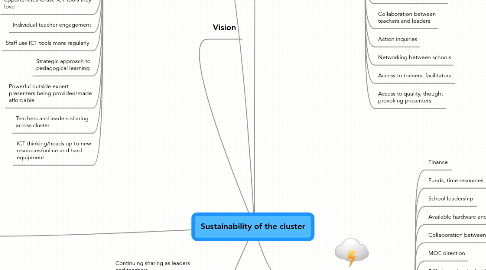Sustainability of the cluster
저자: Tessa Gray

1. Vision
2. 4. How might we overcome these barriers?
2.1. Continuing sharing as leaders and teachers
2.2. Principals working together, communicating together
2.3. Regional clusters
2.4. Knowing everything all of the time
2.5. Effective use of e-learning in professional development
2.6. Community partnerships, sponsorship of funding
2.7. Cluster shares
3. How could we have made a greater impact?
4. 1. From experience in your cluster, what is successful practice?
4.1. Networking with other schools
4.2. Sharing developments
4.3. Looking at development in the outside world
4.4. Incidental dicussions on schools visit on the cluster wiki
4.5. Development of a trusting professional learning community
4.6. Development of teacher skill and pedaogogy
4.7. Developed a school-wide Inquiry model
4.8. Development of teacher skill and pedagogy
4.9. Access to experienced facilitator
4.10. Distributed expertise principals and leaders, Action Inquiry, cluster shares
4.11. Serious thinking about purpose of hardware before purchases made
4.12. Inquiry is an integral part of our school curriculum
4.13. Having on tap a person who can train and develop personnel
4.14. Finding out about areas, programmes, developments, unknown previously
4.15. Gaining a deeper understanding of learning
4.16. Kids leading learning by/via open minds to new technologies
4.17. Teacher only days, conversations and time for these, teachers sharing
4.18. Children are given more opportunities to use ICT tools they love
4.19. Individual teacher engagement
4.20. Staff use ICT tools more regularly
4.21. Strategic approach to pedagogical learning
4.22. Powerful outside expert presenters being provided/made affordable
4.23. Teachers and leaders sharing across cluster
4.24. ICT thinking/heads up to new resources/online and hard equipment
5. 3. What elements or barriers might hamper sustainability?
5.1. Finance
5.2. Funds, time resources, costs
5.3. School leadership
5.4. Available hardware and infrastructure
5.5. Collaboration between principals
5.6. MOE direction
5.7. Differing school priorities
5.8. No facilitator
5.9. Lack of clear direction from leadership
5.10. Lack of networking opportunities
5.11. Pressures on teachers
5.12. The input of new staff
6. 2. From experience in your cluster, what do you want to sustain?
6.1. Cluster shares
6.2. Teacher motivation and purposeful learning
6.3. Quality strategic planning that links e-learning across the curriculum
6.4. Schools sharing, network opportunities
6.5. Teacher enthusiasm
6.6. Regular access to outside expert who challenge boundaries and future thinking
6.7. Money, realistic funding
6.8. SuperClubPlus
6.9. Growth in improved pedagogy
6.10. PLC from principals
6.11. Growth in teacher development
6.12. Online resources, eg cluster wiki
6.13. Principal hui
6.14. Inquiry learning
6.15. Manageable size of the cluster, big not necessarily better
6.16. Collaboration between teachers and leaders
6.17. Action inquiries
6.18. Networking between schools
6.19. Access to trainers, facilitators
6.20. Access to quality, thought provoking presenters


